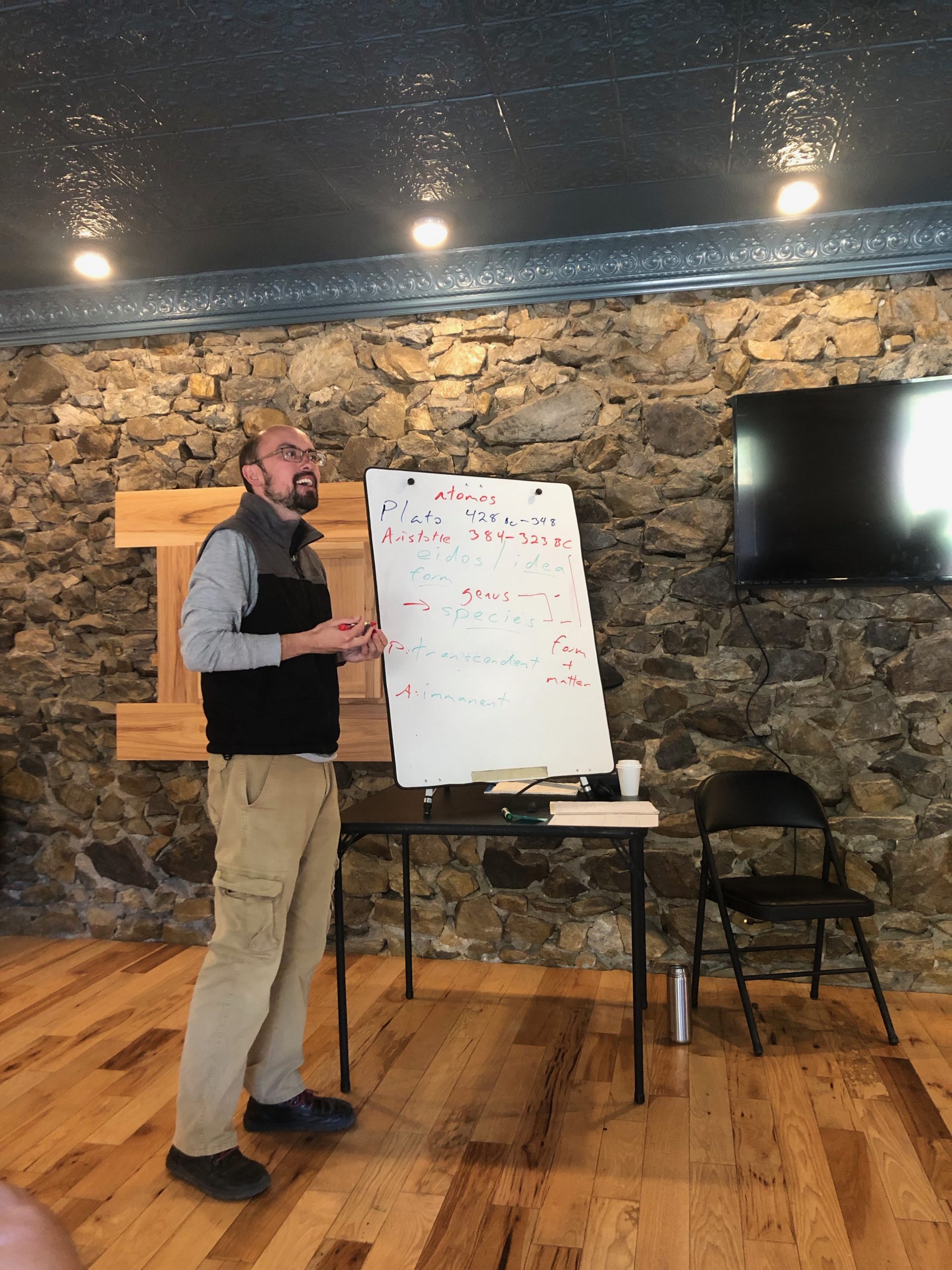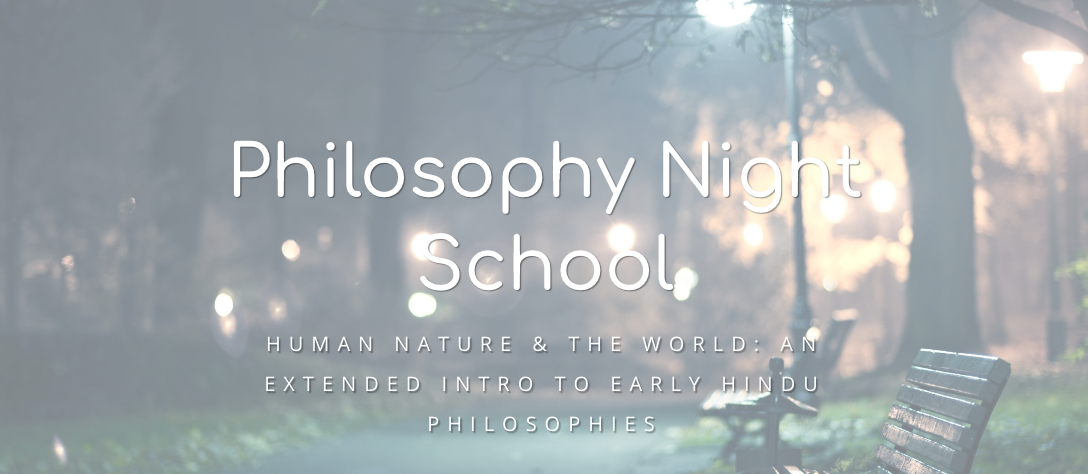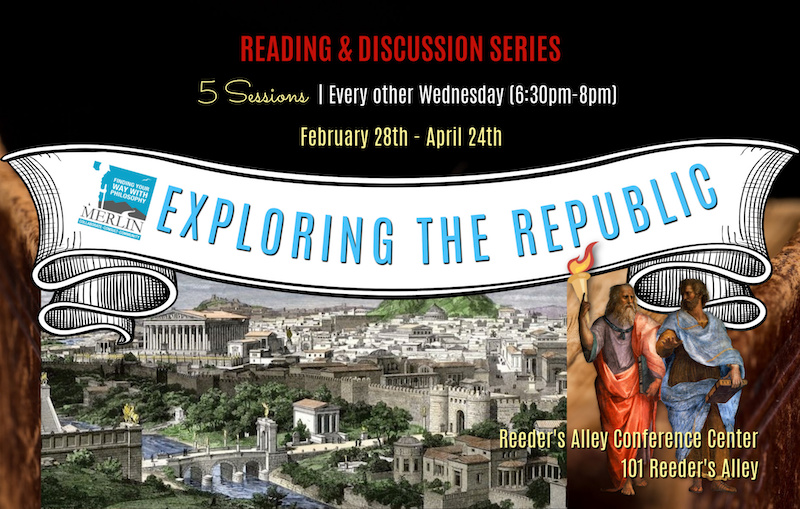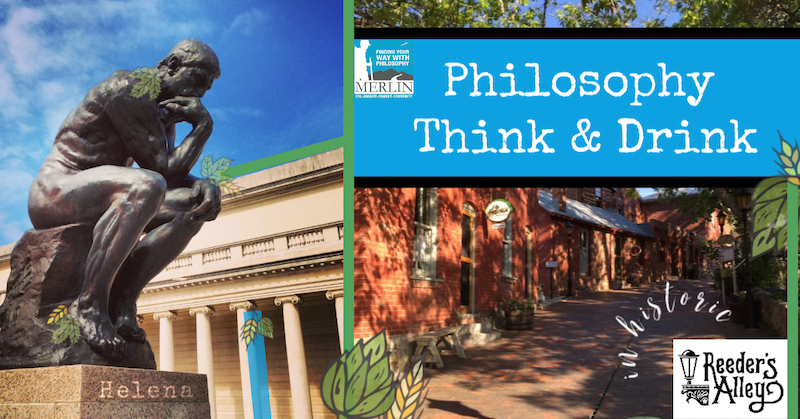
- This event has passed.
Philosophy Night School: “Human Nature & the World: An Extended Intro to Early Hindu Philosophies”
February 10, 2021 @ 6:15 pm - 8:15 pm MST
Course Details
What's Included & What You Will Need (Click here to view)
Participants will receive…
- A brief syllabus (available in early January), with suggestions for supplementary readings. In this pilot course, there will be no required readings. Some future courses will involve assigned texts for reading and discussion.
- Weekly handouts to accompany each class session, with key names, terms, etc.
- A weekly PDF of the slides used in each session, including important diagrams, to help organize and visualize the different schools’ conceptual schemes.
- Access to video recordings of each session, exclusively for registered participants in the course, so that you can catch up if you miss a session, and to review afterwards, when the course is over.
You will need…
- Access to Zoom (by computer, telephone, or other device) during each weekly meeting.
- Access to the slides (mentioned above) for each session. These slides will be shown on-screen during the live weekly session, and will be available as a downloadable PDF, the Monday before each class. If you will be calling in by phone or using a device with a small screen, we highly recommend downloading or printing them in advance. These images and diagrams will be essential for following along with the material.
- A willingness to stretch your intellectual horizons, as we explore potentially unfamiliar ways of seeing the world. You certainly don’t need to agree with any or all of them at the end of the course. But together, we will “try on” each of these three worldviews, and ask the question, “What if we were to adopt this perspective?”
This 4-week ZOOM “Night School” class is an extended introduction to some of the main views and arguments in early Hindu philosophies, focusing on questions of cosmology and philosophical anthropology: roughly, “How is the universe put together?” and “How is the human being put together, in relation to that wider world?” We’ll begin by setting up some general context:
- What problems were these early Hindu thinkers trying to solve?
- What beliefs and assumptions shaped their shared worldview?
From there we’ll present the standard classification of “six systems” of Hindu philosophy, which are traditionally grouped into three pairs. Then we’ll focus in detail on one school from within each pair, each of which provide radically different approaches to explaining the human being and the world:
- We’ll begin with the Sāṃkhya school, which is historically the oldest: a system which predates Buddhism, whose teachings are found in some of the earliest of the Upaniṣads and some important sections of the Bhagavad Gītā, and which provides the philosophical underpinnings for Patañjali’s Yogasūtras, the foundational text of the Yoga school of Hindu philosophy. We’ll explore the Sāṃkhya philosophers’ radical dualism between the person and the world of manifestation, and the process by which that world of manifestation emanates from its original source.
- We’ll then move on to the determined realism of the Vaiśeṣika Far more than any other Indian tradition, the Vaiśeṣikas are concerned with saving ordinary appearances. Roughly, the Vaiśeṣika project is to give an account of “what’s really there” that comes as close as possible to our ordinary ways of thinking and talking about things, while making sure that everything is philosophically consistent—a task which turns out to be much more complicated than it first appears!
- Finally, we’ll take a look one of the most influential branches of the Vedānta school: the “non-dual” (Advaita) form of Vedānta, associated with Śaṅkara, and with many of the later Upaniṣads. Like the Sāṃkhya, the Advaita Vedānta account of the human being and the cosmos is radically revisionary, but it goes in a very different direction, seeking to undercut the apparent duality between the individual person and the ultimate reality.
All of the philosophers we’ll discuss believed that a proper philosophical understanding of ourselves and of the world could, in some way, play an important role in helping us to attain the highest good. But they differ widely over what exactly that good is, and how exactly philosophy is able to help.
So as we go, we’ll be sure to consider what kind of practical guidance each school gives, and how that follows from their particular approach to metaphysical questions. In other words, from within each school’s description of the world and of the human being, we can ask:
- What is the appropriate goal of the philosopher’s life and practice?
- How (in very rough outline) could we begin to approach that goal?
We’ll only have a chance to scratch the surface in this course, but that will be enough to provide a deeper appreciation of how each tradition’s description of the world yields radically different accounts of the philosopher’s goal, practice, and approach.
While this night class goes into as much depth and rigor as the time allows, it will ultimately be introductory, just beginning to get at the complexities of these views. (Future courses, seminars, and reading groups can give us a chance to go into even more depth on each of the various topics, and the ways in which the views and arguments developed over the centuries.) But it will also be extended and interconnected: we will draw careful comparisons and contrasts between the three schools, and suggest some of the major tradeoffs between their approaches.
Each session will be a careful mix of formal presentation of the concepts, with room for questions and discussion throughout. No prior experience in Indian (or Western) philosophy is required or expected.
When & Where
A 4-week night school course led by philosopher david Nowakowski via ZOOM every Wednesday evening through February 10th. No prior background in philosophy is required to participate.
Course Details
Date: Wednesday evenings (Jan. 20th & 27th and Feb. 3rd & 10th)
Time: 6:15 – 8:15pm MST
Registration Info
Registration: See Below
Cost: Sliding Scale (Ranging from $15-$50 per session in the course)
Course Leader

David Nowakowski is as a philosopher and educator in the Helena area whose professional work is dedicated to helping people of all ages and backgrounds access, understand, and apply the traditions of ancient philosophy to their own lives. David began studying ancient philosophies and classical languages in 2001, and has continued ever since. A scholar of the philosophical traditions of the ancient Mediterranean (Greece, Rome, and North Africa) and of the Indian subcontinent, reading Sanskrit, Latin, and classical Greek, he earned his Ph.D. in philosophy from Princeton University in 2014. His work has appeared in a variety of scholarly journals, including Philosophy East & West, Asian Philosophy, and the Journal of Indian Philosophy; as well as in presentations to academic audiences at Harvard, Columbia University, the University of Toronto, Yale-NUS College in Singapore, and elsewhere.
After half a decade teaching at liberal arts colleges in the northeast, David chose to leave the academy in order to focus his energies on the transformative value of these ancient philosophical and spiritual traditions in his own life and practice, and on building new systems of education and community learning that will make this rich heritage alive and available to others.
Register Here
Once you register, you’ll receive a payment confirmation e-mail which secures your place in the course. Registration closes at 2pm on January 20th.
Zoom Info
As the course start date approaches, your night school instructor will e-mail you your ZOOM log-in information for the weekly sessions.
For those who have not used Zoom before on your computer, click here to do a test run and ensure your system is working properly: https://support.zoom.us/hc/en-us/articles/115002262083-Joining-a-test-meeting.




